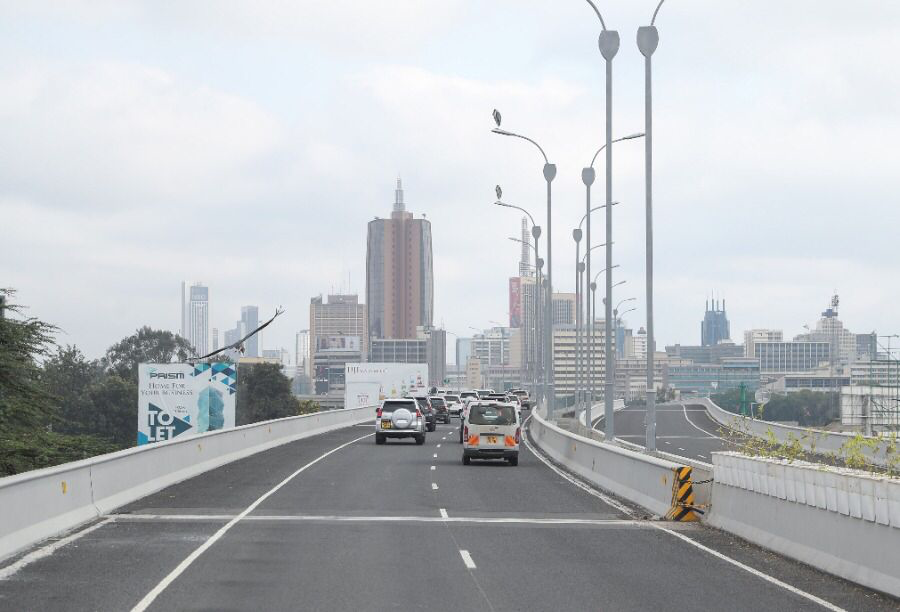Published: May 16,2022
By Gerald Mbanda

In the Kenyan capital Nairobi, a Chinese-built and financed tollway or Nairobi express highway as it is commonly known, was opened over the weekend. The 27.1 km road linking Jommo Kenyatta International Airport and Nairobi city was financed by the state-owned China Communications Construction Company while the construction work was carried out by the China Road and Bridge Corporation (CRBC). The project is one among China’s Belt and Road Initiative (BRI) projects that are changing the face of Africa.
The Nairobi express highway will reduce trafficcongestion on Mombasa road where motorists have been spending hours in traffic jam especially during rush hours. The road was opened on Saturday on a trial basis, while the actual launch will take place in June. Traffic Jams in Nairobi are estimated to cost the Kenyan economy Sh100 billion every year, which would translate to about Sh11 million per hour, according to a study commissioned in 2019, by the Nairobi Metropolitian Authority (NaMATA).
The Nairobi express highway was financed throughpublic private partnership (PPP). It is argued that under this model, the governments’ loan burden and budget deficits are reduced. The Kenyan President UhuruKenyatta is said to have struck the deal to build the express highway in 2018, when he met with Chinese president Xi Jinping in Beijing.
During the Forum for China and Africa Cooperation meeting (FOCAC) which took place in November last year in Senegal, China pledged to continue to offer grants, interest free loans, concessional loans and other financial support to African countries. “Innovative ways of financing will be explored to support Africa’s infrastructure development,” according to a statement released after the FOCAC meeting.
Chinese economists, Justin Lin and Yan Wang, argue that,“conventional development aid is inadequate to address the bottlenecks to growth in many developing and emerging market economies, including those in sub-Saharan Africa.” They further say that China relied on a combination of aid, trade, and investment to kick-start Africa’s structural transformation process. “China’s own experience since the 1978 economic reforms period demonstrated the country’s impressive ability to lift hundreds of millions out of poverty through a gradual and contained approach around markets,” according to Lin and Yan.
Therefore, it is no surprise that China applies the same approach when dealing with other developing economies, including Africa. China’s developmental approach is different from the western model and“challenges the Washington Consensus, based on free markets and economic liberalization,” according to a paper by the Italian Institute for International Political Studies (ISPI). The paper further reveals that, “Beijing’s approach to cooperation is about “focusing on development and improving people’s lives” and “providing the means for independent development” of each country. This is contained in China’s 2021 White Paper on International Development Cooperation.
Following these principles, China’s engagement and economic relationship with Africa, is more focused on trade, investment, development finance, and other forms of cooperation that promote Africa’s growth, rather than dependent on loans and aid. China-Africa cooperation therefore, hinges on mutual economic interests which have contributed to promoting Africa’seconomic transformation.
The BRI provides a means of bridging the trade-finance, and more broadly, the overall financing gap in Africa. Currently, Africa ranks behind other regions in terms of its overall level of regional trade integration.
The African Continental Free Trade Area (AfCFTA) is responsive to Africa’s integration aspirations, as envisaged in the African Union’s Agenda 2063, a blueprint for transforming Africa into a global powerhouse of the future. China’s Belt and Road Initiative (BRI) and the AfCFTA are like two sides of the same coin that complement each other in Africa’s development trajectory.
 Africa -China Review Africa -China Cooperation and Transformation
Africa -China Review Africa -China Cooperation and Transformation
